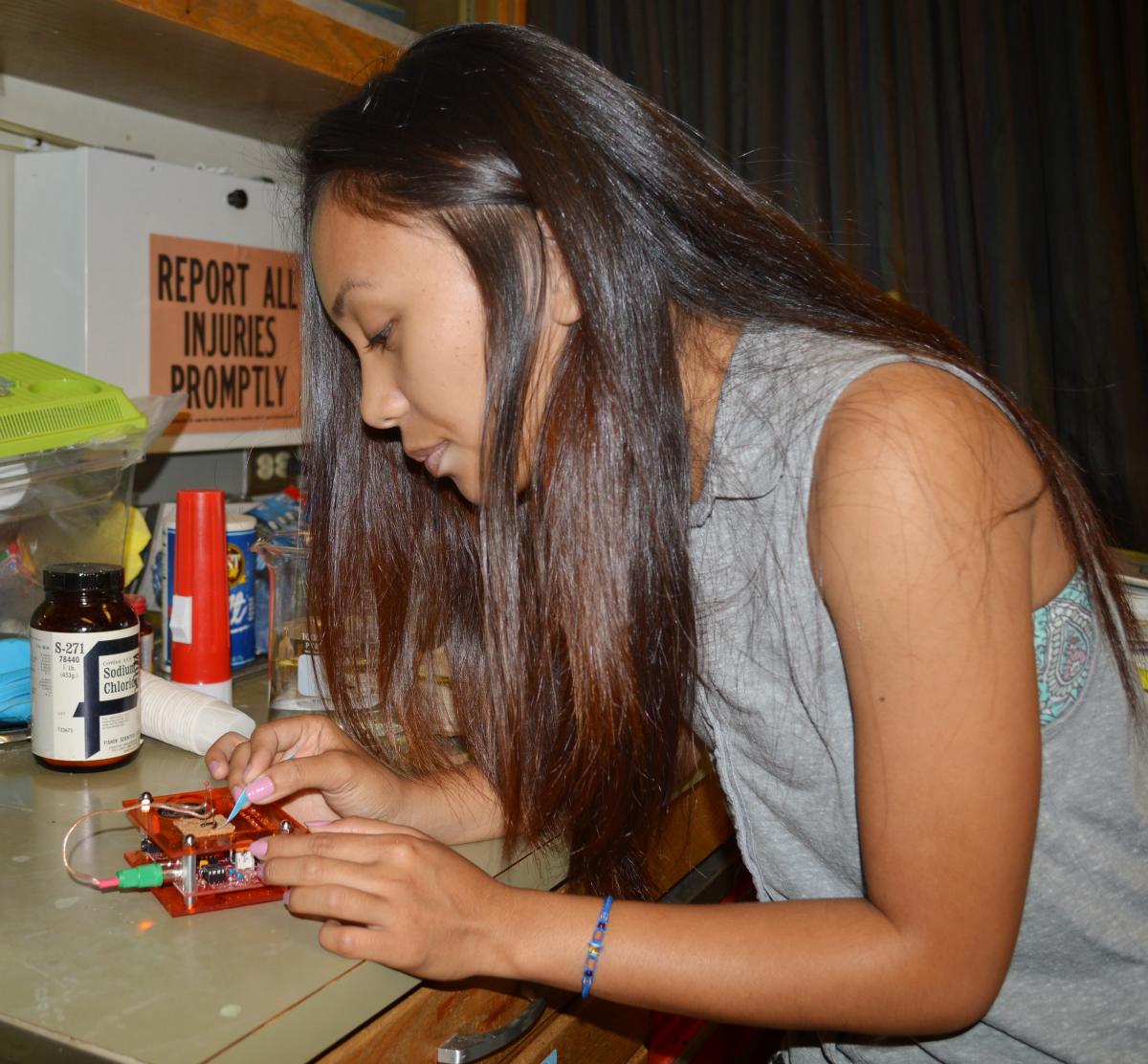 The Center for Sensorimotor Neural Engineering has hosted a total of 16 students in the Young Scholars Program (YSP), a model developed and supported by the National Science Foundation, over the last few years.
The Center for Sensorimotor Neural Engineering has hosted a total of 16 students in the Young Scholars Program (YSP), a model developed and supported by the National Science Foundation, over the last few years.
The YSP provides summer research experiences for high school students and aims to develop students’ knowledge and skills related to sensorimotor neural engineering.
Now, a new study from the Center’s education team provides insight into the success and challenges of the first three years of this program. Kristen Bergsman, CSNE pre-college education manager, highlighted a few key points below. She presented findings from the study today in Seattle at the American Society for Engineering Education annual meeting.
Q: Tell us a little bit about the study design.
Bergsman: The program evaluation was done three different ways, which gives it more power. The evaluators used multiple types of data collection. The first one is a post-program reflective survey, so at the end of each summer session, students take a reflective survey and respond to questions that require them to consider, "What was it like for me before the program and what is it like for me now?"
Evaluation team members also conduct follow-up interviews five months later. We have high percentages, between 71 and 80 percent, of YSP participants interviewed each year. The third thing we’ve done is longitudinal tracking, to see where they are now (with email queries to past participants).
Q: What were the major findings of the study?
Nearly all of the things we’re trying to improve their competency in is working. We’re increasing students’ skill sets. In many cases, it’s statistically significant. The outcomes for the program are based on sensorimotor neural engineering skill sets, including developing skills that are important for students moving towards careers in STEM fields.
The skill sets we’ve developed include content knowledge, personal skills and professional skills. With the YSP program, there’s a focus on apprenticeship, with the students apprenticing into the skills of engineers, and practices of engineers through a vertical mentoring relationship. Principal investigators and graduate students serve as mentors. So we’re not only developing the students’ own practices as future engineers but also seeing them at play in an authentic setting. It’s really valuable for students at that age, to see engineers actually engage in engineering. How do they talk about research, how do they communicate their findings, what kind of problems are they solving?
The stories behind the data, for me, is what’s powerful. Students shared personal reflections on what is really meaningful to them. As one example:
In high school, there is always a solution. But often in real science, there isn’t always a solution or the solution isn’t what you want it to be.
We also heard from students who said the biggest benefit was the exposure to female researchers:
I wanted to see females being successful in scientific fields. The ratio is so overwhelmingly male. Very encouraging to see a female in power and not be questioned. I never had a female math or science teacher in high school and this was something that was important to me.
Q: What challenges did you find?
Bergsman: We heard from mentors that it’s hard to come up with research projects that are bite-sized. There are a lot of constraints, connecting neural engineering and making it something that a high school student can do. And they haven’t learned MatLab yet, so that creates a challenge.
Q: What are the implications for the YSP program?
Bergsman: People can take the model of how we run the program, look at the mentor relationships, amount of time they’re in the labs, scientific communications class that Dr. Lise Johnson has developed, and the culminating presentations. That model could be easily replicated.
There are things I’d like to do for our program, including fleshing out the mentor orientation that we do. Can we set people up for success with mentoring skills? This year, I gave our research paper to YSP mentors.
The other thing I’m trying to do is recognize it’s a program that students are trying to do right before college. There’s a lot of value for them, even during the down time. The YSP students text each other and decide to work on their homework at a coffee shop, that’s a “college experience” that isn’t a structured program.
This year, we’re going to hold a study session after the scientific communication class, just for the YSPs. I want to do more cohort-building. It can be intimidating for them. I want to provide experiences where they’re insulated a bit and they feel free to ask questions that they would never ask.
In the future, I’d like to engage parents more. We could host an orientation night including parents. They are invited to attend the final talks and the undergraduate research symposium. We also encourage parents to come to the lab during initial meet-ups.
Study authors include CSNE’s Kristen Bergsman, Dr. Lise Johnson and Dr. Eric Chudler. Dr. Laura Collins and Jill Weber from the Center for Research and Learning were also co-authors; they designed, implemented and, now, conduct the program evaluation.
